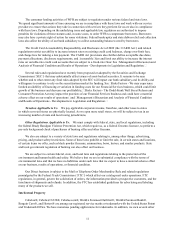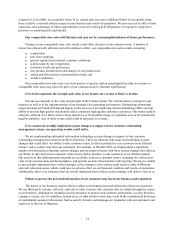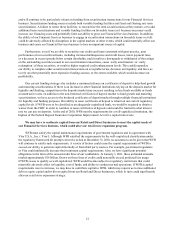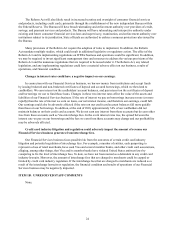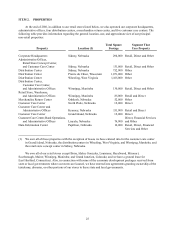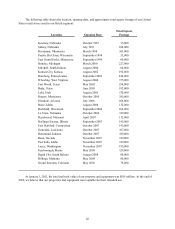Cabela's 2010 Annual Report Download - page 27
Download and view the complete annual report
Please find page 27 of the 2010 Cabela's annual report below. You can navigate through the pages in the report by either clicking on the pages listed below, or by using the keyword search tool below to find specific information within the annual report.17
such as the price and availability of raw materials and fabrics, labor disputes, union organizing activity, strikes,
inclement weather, natural disasters, war and terrorism, and adverse general economic and political conditions that
might limit our vendors’ ability to provide us with quality merchandise on a timely basis. We have no contractual
arrangements providing for continued supply from our key vendors and our vendors may discontinue selling to us
at any time. We may not be able to develop relationships with new vendors, and products from alternative sources,
if any, may be of a lesser quality and more expensive than those we currently purchase. Any delay or failure in
offering products to our customers could have an adverse impact on our revenue and profitability. In addition, if the
cost of fuel rises, the cost to deliver merchandise to the customers of our Direct business and from our distribution
centers to our retail stores may rise which could have an adverse impact on our profitability.
Political and economic uncertainty and unrest in foreign countries where our merchandise vendors are
located and trade restrictions upon imports from these foreign countries could adversely affect our ability to
source merchandise and operating results.
In 2010, approximately 17% of our merchandise was imported directly from vendors located in foreign
countries, with approximately 91% of our imported merchandise being obtained directly from vendors located
in China, Vietnam, El Salvador, India, and Taiwan. In addition, we believe that a significant portion of our other
vendors obtain their products from foreign countries that may also be subject to political and economic uncertainty.
We are subject to risks and uncertainties associated with changing economic and political conditions in foreign
countries where our vendors are located, such as:
• increased import duties, tariffs, trade restrictions, and quotas;
• work stoppages;
• economic uncertainties;
• adverse foreign government regulations;
• wars, fears of war, and terrorist attacks and organizing activities;
• adverse fluctuations of foreign currencies; and
• political unrest.
We cannot predict when, or the extent to which, the countries in which our products are manufactured will
experience any of the above events. Any event causing a disruption or delay of imports from foreign locations
would likely increase the cost or reduce the supply of merchandise available to us and would adversely affect
our operating results, particularly if imports of our Cabela’s branded merchandise were adversely affected as our
margins are higher on our Cabela’s branded merchandise.
In addition, trade restrictions, including increased tariffs or quotas, embargoes, safeguards, and customs
restrictions against apparel items, as well as United States or foreign labor strikes, work stoppages, or boycotts
could increase the cost or reduce the supply of merchandise available to us or may require us to modify our current
business practices, any of which could hurt our profitability.
Due to the seasonality of our business, our annual operating results would be adversely affected if our
revenue during the fourth quarter was substantially below expectations.
We experience seasonal fluctuations in our revenue and operating results. Historically, we have realized a
significant portion of our revenue and earnings for the year in the fourth quarter. In 2010 and 2009, respectively,
we generated 35.1% and 34.9% of our revenue, and 59.1% and 33.5% of our net income, in the fourth quarter. We
incur significant additional expenses in the fourth quarter due to higher customer purchase volumes and increased
staffing. If we miscalculate the demand for our products generally or for our product mix during the fourth quarter,
our revenue could decline, which would harm our financial performance. In addition, abnormally warm weather
conditions during the fourth quarter can reduce sales of many of the products normally sold during this time
period and inclement weather can reduce store traffic or cause us to temporarily close stores causing a reduction
in revenue. Because a substantial portion of our operating income is derived from our fourth quarter revenue, a
shortfall in expected fourth quarter revenue would cause our annual operating results to suffer significantly.






